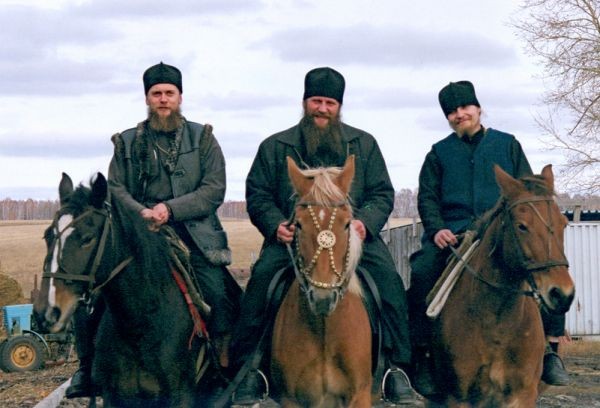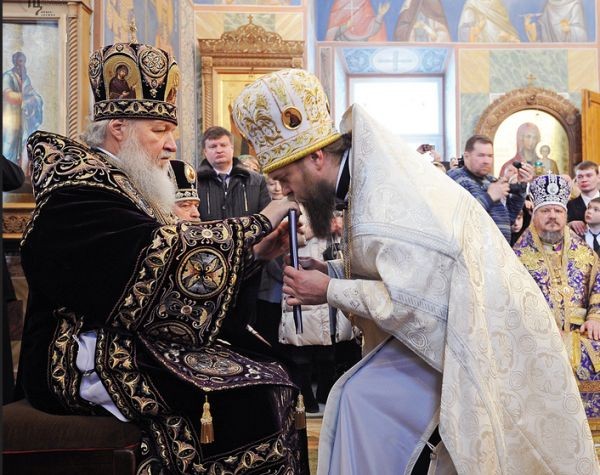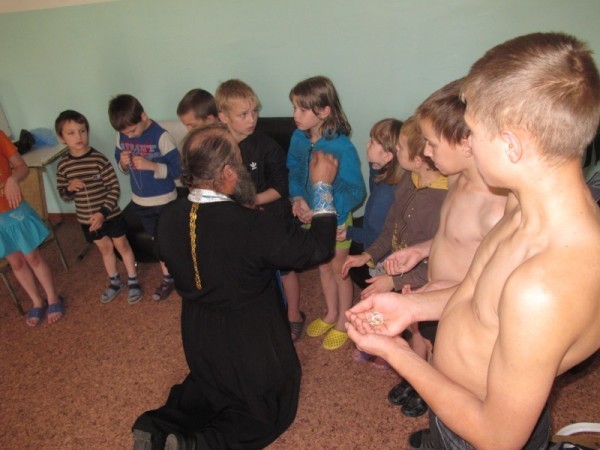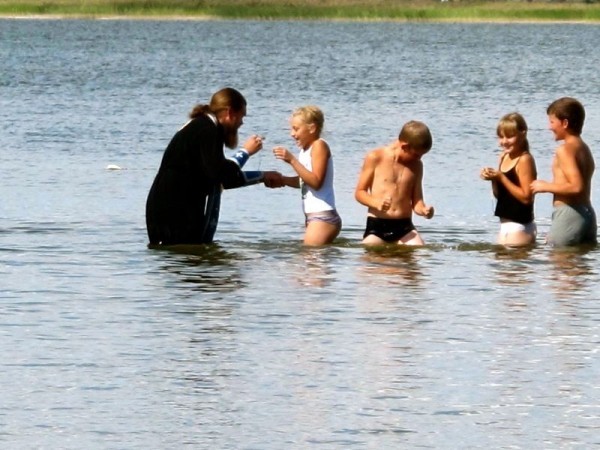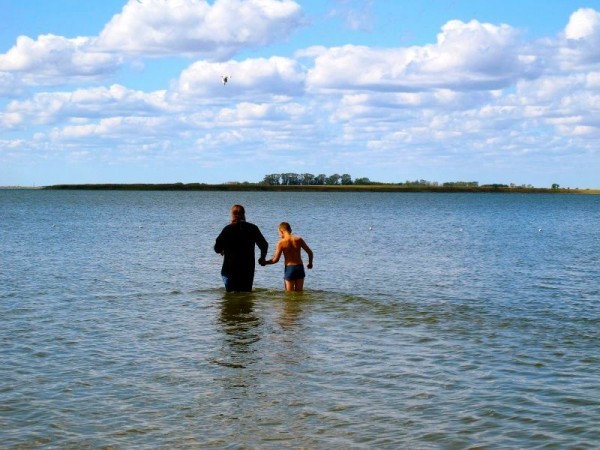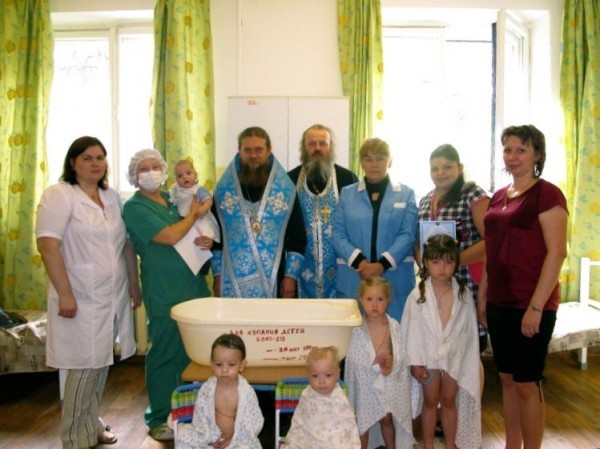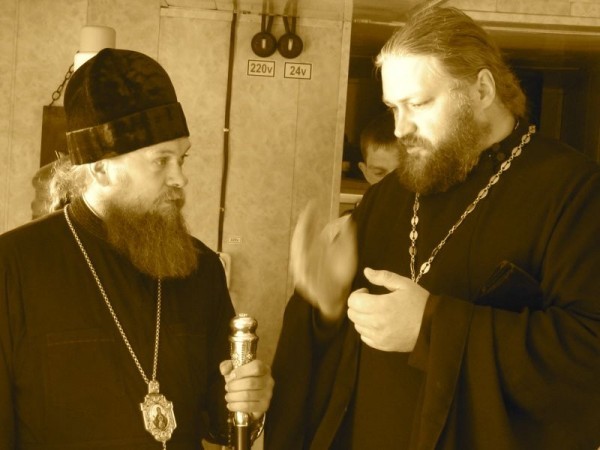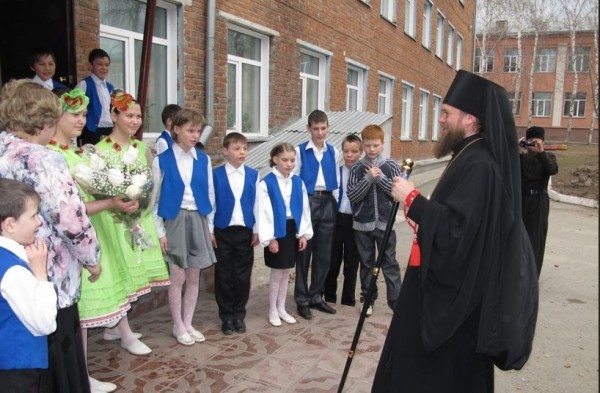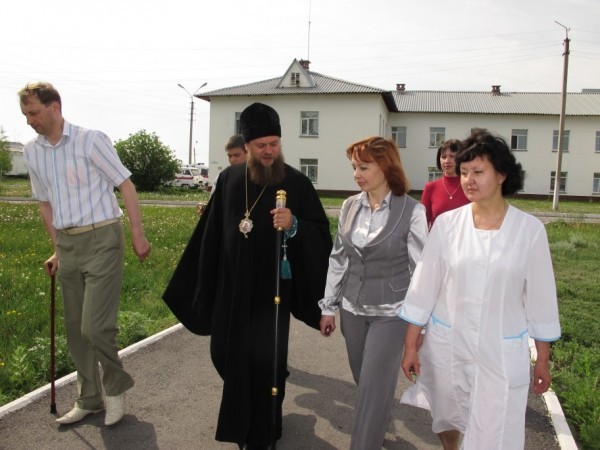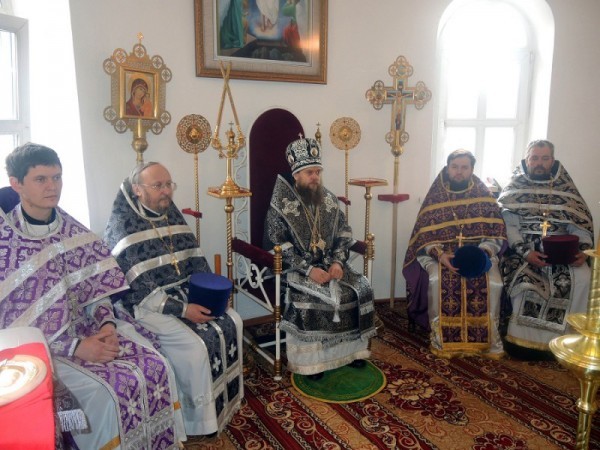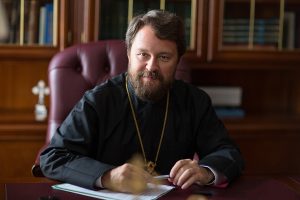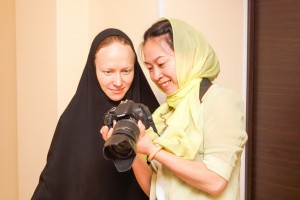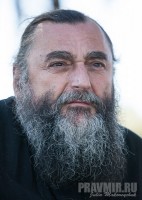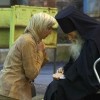Karasuk and Orda arrived in the Novosibirsk diocese in 1996, as a young heiromonk. He has headed the Karasuk Diocese (part of the Novosibirsk Archdiocese) since December 2011. Vladika regularly baptizes children in the quarantined tuberculosis sanatoriums of Novosibirsk that help with the socialization of orphans.
When children are born, they should be baptized
– Vladika, tell me about your childhood. Did you grow up in a family of believers?
– My Mom worked in a nursery school and my father was a driver. They were believers to a degree, but not church people. Just sort of “routine”. When a child is born, he or she should be baptized.
I found out there really weren’t any church goers in our family. I asked about family on both my Mom and Dad’s side. You could say that baptism was just a tradition.
There were never any icons in our house, and then somehow my mother bought an icon. A neighbor whose husband either died or left, wanted to throw it away in frustration, and my Mom offered: “Come on, I’ll buy it from you for 10 rubles”. So in our one-room flat (my parents slept in the room, and my brother and I in the kitchen) a shrine appeared for the first time, with the “It is truly meet” Icon of the Theotokos. We knew it was an icon and the icon was of God, and that you can pray to him in your own words, so that everything would be okay. This was the extent of our childhood theological knowledge.
In general, my childhood was good and happy. Our building was built for young families, and six of my classmates shared the same entrance. We went out together in the morning, and came back together at lunch. It wasn’t boring. Almost all of my companions went to the technical school that was located just in front of our house.
I was almost the smallest in my class until I was 13-14 years old, and so I tried to be the soul of our group and a person who supported his friends. In the late eighties, we started to hang out with the guys who were wrestling and boxing. Fighting lessons help young men to gain self confidence as they realize that they can stand up for themselves.
– When did you consciously come to faith?
– Somewhere in the first year of chemical engineering college (that is in the early 1990s). I was born in the suburbs of Moscow, in Staraya Kupavna. In 1990, they began to rebuild the church, and we, as students, were sent to work there on Saturdays. It was clear that the senior priest phoned the director and asked if we would help remove trash and cleanup the area.
These trips were very interesting. It was like a new world was opened to me and I saw the Bible for the first time, thanks to my history teacher, who brought the book to class.
I also participated in sports such as wrestling, boxing, martial arts, and studied Eastern philosophy. And, oddly enough, it can be also be called a small step in the search for the True Faith.
One day, having gone on an excursion in the Trinity-Sergius Lavra, I went to the seminary and grabbed a sheet listing the admission procedures. One step is to receive a recommendation from a priest. At that time I was not even acquainted with a priest.
So I went to a service at the church, and spoke with Fr. Sergey Tkachenko, when it was finished. It was the first time he had even seen me and I said that I needed his signature. He replied: “You have to go to church, and learn about it.” “I don’t have that much time”, I said. “I need to do everything quickly.” In general, I began to go to church, and began to serve. I first came to Fr. Sergey in early January, and I had already been admitted to the seminary by August.
– Why did you suddenly decided to enter the seminary?
– Remember the the beginning of the nineties: first the coup, rallies, then endless criminal infighting, shootings, word that someone was shot, someone put in prison … At that time, graduates of secondary and higher educational institutions were freely given diplomas, without compulsory workers placement.
I thought and looked at what was going on around me and it was easy not to return to that. I decided to enter the seminary. I felt that there was something important there. Yes, and it was simply interesting.
I did not think about a specific path or when I would enter the seminary to become a priest or select the monastic way.
– Your parents probably did not expect you to go and study at seminary, did they?
– They were in disbelief for a couple of months. Although, their surprise began even earlier, when I started to go to church and serve. They immediately began to shower me with questions: “Why? What for? Maybe something is wrong with you? Maybe you have some some sort of problems?”. Then I explained that there weren’t any problems, and that I just wanted to go to seminary. Incidentally, when I entered the seminary, I persuaded my parents to get married in church.
Service in the army and ordination
– In the army, you became a future seminary student. Did those you who served with you, know that you are a believer?
– I was drafted for a year and a half and I served that time in Krasnoyarsk at a SHMAS flight training unit as a guard. You could say that I had a gun in my hand 24 hours a day.
By that time, the army already treated people of faith with respect, and when the commander learned that I was a seminarian, he let me go to church on the weekends and called me to talk with him. We talked and later I brought him Orthodox books. The guys also treated me with respect.
As far as the material side of things — there certainly were no difficulties there.
I was not a spoiled person. My childhood was spent in a one-room flat. I never had expensive things or even my own corner. I was only given a wristwatch when I went to technical school.
In seminary, we lived 12 people to a room. In the army, it wasn’t 12 but 100 people in the company. That was the domestic contrast. The structure was the same as in the seminary — discipline. Moreover, I was prepared athletically, so I really didn’t have any problems.
– When did you have the idea about monasticism?
– When I entered the seminary, I thought that I would just study. Within six months, I realized that the seminary prepares priests. Well, a priest is a priest and I continued my studies.
Then our class’ leader, Archimandrite Georgiy (Tertishnikov) began telling us that we should decide with our confessor, which path to select —marriage or monasticism.
It was then that I realized that there are two ways – monasticism and family life. I began to think. I spoke with Fr. Kirill (Pavlov), Fr. Eli (Nozdrin), and then even began to go to Fr. Naum (Bayborodinu). I traveled to Ioann (Krestyankin). My Confessor said, “A monk would be better”. Then I said: “Father, bless”.
So my path was determined without any ambivalence or doubt. Actually, I never sought a family life. I always spoke with girls like friends, and no one stood out at school or technical school. In seminary I had the obedience to sing in a mixed choir. Again – all was just friendly relations. As they say, nothing personal.
– How did your parents take the news about your monasticism?
– This was simpler. I hadn’t lived with my parents for three years, was more independent, and had served in the army, but my mom was still worried. I reassured her that my younger brother would resolve the issue of grandchildren. Then I took her to my Confessor. I brought her to the priest, she confessed and talked. Then I said to her, “Mom, this is the will of God.”
Then I asked for my parents blessing to take the vows. They gave me their blessing and presented me with an icon of Our Lady of Kazan.
– Shortly after taking vows, you went to Novosibirsk. Again, life changed…
– I visited Siberia for the first time, where I served in the Army in Krasnoyarsk. I already had an idea that I was not just simply there, but that God had sent me. I had finished the 3 year at seminary, when Vladika Sergey (Sokolov) visited and said, “I need a seminarian and a missionary who will go with me.”
I agreed, but first tried to say that, maybe I needed to finish my studies full-time, but I heard the reply: “Go, it is the will of God.” I didn’t bother to debate it, but went to Vladika Sergey and said, “I’m ready”. He said that I first needed to take vows and be ordained.
On July 15, 1996 I was tonsured a monk at the Trinity-Sergius Lavra by Vladika Sergey. on July 16, I was ordained a deacon and on July 18, a heiromonk. All in three days. You can imagine how I felt, not fully understanding what happened to me from an overabundance of feelings. Soon, I flew with Vladika to Novosibirsk.
– How did you adjust to to the new place?
– Vladika said that all my things would be sent in his container. So I sent “all my things” — a small suitcase. The container was delayed for about two months. It turned out that except for monastic robes, I only had a sweater.
I thought that Vladika would send me to live in the parish or an apartment, and he took me with him to the bishop’s residence. I, an ordinary young man, was accustomed to living in a one-room flat and dorms. It seemed as though I was in royal chambers… Everyday I would wake up and think, that this was not happening to me.
On October 6, 1999 I was appointed vice-rector of the Monastery of St. Eugene the Martyr.
Baptism in the Ob River
– How was church life during your first missionary journeys, including the time on board the church ship, St. Andrew the Apostle?
– At that time, in 1996, there was incredible interest in the Church. There was just a stream of people going to be baptized and married, and we were constantly being invited to hospitals and schools. When I arrived, I served at Resurrection Cathedral in Novosibirsk. There were two veterans homes under my care, where I served once or twice a week, and a City Hospital with eight campuses. I arrived there at 7 am and departed at 4 pm.
Plus, I also went to orphanages, and in the summer I took missionary journeys by ship. When three – four priests and novices came to the monastery, we were given a car. Glory be to God! Until then, I went everywhere under my own power. It was good that I was only 23 years old and that I had the strength to constantly move around the city.
In Novosibirsk, there was a tradition that the priests removed their cassocks after services and went home in their “civvies”. As monks, we always wore cassocks.
There were few priests in Novosibirsk at that time. Everyone looked at you when you went down in the subway. You had the feeling that you brought an elephant with you on the subway — the same was true on the shuttles. Also, there would be drunks that would sit down and start to cry: “Father, help me, so I don’t live like this!”
– How did you then, a young priest, with almost no spiritual experience, cope with the pastoral work and the flow of people asking questions?
– First, the seminary provided a lot of experience by offering communication with priests, teachers, and friends.
Second, helping elderly priests in the cathedral, where I served.
Third, three priests came with me — the now Vladika Artemiy, Bishop of Petropavlovsk and Kamchatka; and Vladika Nikolai, Bishop of Salekhard. We have always stayed together and consulted one another if there were difficult questions.
– How much have missionary assignments changed since the time of your first visit?
– Back then, quantity was important — that is, to reach more people. One missionary trip on the ship, we baptized 2500 people — and 5000 people on the train.
Now, when I travel to a village and see that there are only twenty people getting baptized, I even become a little discouraged. “Well, what’s this? There are people here. Why aren’t they coming?” And I remember, earlier you would come to the village, and there would be two hundred or three hundred people.
Then we would baptize from morning till night. Moreover, in a variety of sometimes extreme conditions and in different situations. Sometimes in Ob and sometimes in intensive care …
Now, it is not as much the quantity, as there are other forms of missionary work. We listen to more confessions and provide communion on missionary trips.
We often go to meetings at schools, and have begun to conduct conferences, which are also very important.
We hold conferences with teachers since a lot of attention is given to working with young people, students, and children. Priests shouldn’t wait for people to come to him. During the mission trip, our priests are in somewhere from five – seven schools each day.
While in Novosibirsk, people are waiting everywhere for priests and are delighted to see them. In the back country, though, we can say that it is just like the beginning of the nineties. There, they look at priests like they used to look at me in the subway, and if a priest does come, he simply will not be allowed in the schools. It is different though if the mission trip is under the auspices of the governor and the Ministry of Health and Education. Then they can no longer keep us out.
– Are there enough priests in the Diocese? How are parishes organized in those villages where they are accepting the Church, as you said, like it is just the beginning of the nineties?
– There are not enough priests. Each priest must serve two or three churches. Even in Cathedrals, second priests only appeared recently.
The organization of parishes — yes, that’s a problem. How can you send a priest to a village where 500-700 people are living? Recently, I ran into a situation where a benefactor built a church in the village and built a house for the priest with a banya (sauna). The director of the state farm pays the electricity for the church.
The priest, though was only able to live there for two months. He didn’t have an income. On Sunday, only 3 grandmothers came to services. In a month, 500 rubles were put in the offering. He had a family with children … and it is very difficult to live in remote areas without a car.
His Holiness the Patriarch said that in these cases it is best for priests to serve in a cathedral, and travel to the churches in distant villages on Sunday. In the monasteries it is called a farmstead. So this is the system our diocese utilizes.
A call at three in the morning: “Vladika, how are you?”
– You have been feeding orphaned children, traveling to orphanages, caring for children in the family unit. What has changed in this field?
– In 1996, there were 150-200 persons in the children’s homes. Now there are 50-60 in the orphanages. They were under the Department of Education, and now they have been transferred to the Department of Social Welfare. As a result, both children and adults are suffering from all these realignments. The authorities,of course can see this.
Now, small orphanages are disbanded. It is necessary to show that the number of children’s homes has decreased. Only, this is not being done by placing children with families, but by consolidating orphanages. Although, a lot more children are being taken in by families.
The second problem is that a lot more of the children in orphanages have health problems, than ever before. Earlier, children in orphanages were more likely to have been given in birth to a normal, young mother, who later began to lead a antisocial lifestyle.
Now, girls from 1985-1990 are having children that are already future drug addicts and drunkards. Children have correspondingly different pathologies.
Still there is another problem. Children are being actively adopted, but apparently, since there is no qualified help for foster families, some children are being returned a second time when parents refuse them again.
– How can the Church work with these children?
– We are doing this, although it is very difficult. Its hard to hold the hand of a graduate from a children’s home. As money appears, he will get drunk and go on a spree, but he is already 20 – 25 years old.
The big problem is with relatives. The young man himself may be good, but there are two brothers sitting in jail and a mother who is hanging around with who knows who — and they call and give threats. They are afraid that we will encroach on the money that all institutionalized children have in a savings account.
I always tell the ward: “If there are any problems, come to the church.” And all the children from orphanages know this and come.
– Can you please remember some specific stories of orphaned children, and adults and babies.
– Sometimes infants are just abandoned. We were in a monastery once and they abandoned a boy. In the morning, we get up at 6:30 as a rule, and there at the gates is a bag made from a blanket. We open it, and there lies a baby boy with a recently cut and bleeding umbilical cord. We baptized him and named him Misha Tsarev. Then we received a call from the orphanage saying that Misha had been adopted.
Still another time, a girl from the orphanage, who was soon to be released, became pregnant. Of course, everyone around began to insist on an abortion. We literally hid her in the Orthodox nursery school. Of course, I wrote a letter to the Director that she was with us. She gave birth to a girl. Glory to God! Now, the life of the baby girl and her mother are all right.
When I learned that another graduate, Svetlana, was going to have a baby, I suggested, at the time, to leave him at the children’s home. At the time, she was able to leave the baby without giving him up (there are such forms), until she could somehow secure housing. The last three months of her pregnancy, Sveta lived in a stairwell. She seemed to agree, and then there was the call: “Come and pick me up. I was discharged from the hospital, and I don’t have anywhere to go”. I had to go and pick her up. Our parishioners, grandmothers, and women worked it out and took her in and gave her shelter. Six months later, she somehow managed to pull through and then got married.
The monastery frequently takes boys from the orphanage on vacation. Today, seven graduates from the orphanage live in the monastery as novices.
– So, can a child from an orphanage or a graduate call you?
– Now, I don’t give any of them my phone number. They have called at three in the morning: “Vladika, good afternoon, how are you doing? I am doing well”.
We’ve created a VKontakte page for institutionalized children so that they can contact me. If I am not mistaken, we have 650 people there. These are children, whom I personally know.
They write different things. They ask for a child to be baptized, to give them groceries or other things. I am sure to give. Or they ask: “My mother died suddenly. How is the burial service handled?” They ask about getting married at church. Yes, they ask a lot things! I find it easier to answer them through VKontakte. What would I do if all 600 people called?!
I don’t give money and so I have never been cheated. A guy will come and burst into tears: “We urgently need five thousand rubles or they are going to take our apartment tomorrow”. I answer: “Lord! Of course you can. No problem.” Within some time, information comes to me: “Vanka came over and said that he pulled a fast one on Vladika. “I got some money, and went out on the town for two days with the boys”. It has happened so many times. Now, I can give 100-200 rubles for the road. I say: “It is better to take the groceries. Take some things. Money is a temptation. ”
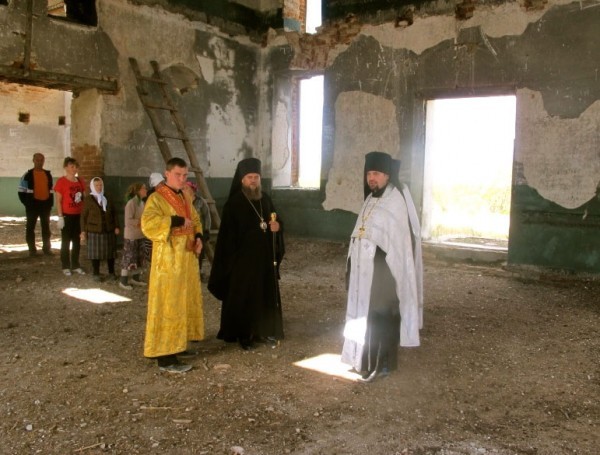
A Saturday trip to work in the abandoned church of the Holy Trinity, Yudino Chistoozyorny District, August 17, 2012
– Do you help them to somehow find employment?
– Not so much anymore. The government does a good job for them. They used find them work at a factory or as painters and the girls as nursery school teachers.
Now, the State allocates decent apartments and monitors them so that the graduates move into them and don’t rent or sell them.
It was different not so long ago. They gave them apartments we would come and there would be five homeless people living there. They just threw the real occupant onto the stairs. The Orthodox Militia had to be called, to disperse these drunks. It was a real showdown!
In the children’s home, I make sure to come at Christmas and Pascha to bring greetings to over 2,000 orphans.
In May, we take them to the holy spring. These types of trips are needed very much. If you come to the orphanage and give a lecture, you are not a friend, just a teacher. If you go somewhere with them, though, you are already one of them. Especially when you have shared some difficulties with them.
In the summer, we always conduct an Orthodox camp for 35-40 orphans. We go with them to the Altai Mountains, raft on the Katun, live in tents, and do rock climbing and hiking. We are sure to have confession and receive communion on the weekends. Boys serve at the altar.
We make sure not to just take children from one children’s home, but three or four from each. The Lord called the 12 apostles and they’ve already gone all over the world. We’re trying to follow his example with some leaven. These three or four children then return to the orphanage and say that the Orthodox are good, and that the Orthodox do not drink and do not smoke. They will talk about how they played sports, climbed mountains with the priest, went to confession, and had communion.
– You still visit a juvenile drug treatment center…
– I must say that there are not drug addicts in my orphanage. There are “home” children, from parents who smoke and inject. They are mainly brought to the orphanage for drunkenness. I support 15 children’s homes and there are no drug addicts.
So, I do not often go to drug treatment centers: I travel most to places where there are orphans. So, there is a center in the diocese that deals with adult and juvenile drug addicts.
I recently went to the tuberculosis sanatorium. It also has it own unique characteristics: not everyone decides to go there. Some priests refuse, because there are patients with active forms of tuberculosis.
Although this is a quarantined institution, we have been going there for the last 15 years and have been making friends with the personnel. They treat us as their own.
I also have become acquainted with the dispensary thanks to the orphanage, which had few people there. Primarily, though, the children there have parents.
On the border
– What is special and unique about your diocese?
– The first feature of our diocese is that we are on the 500-600 km border between Russia and Kazakhstan. Therefore, we pay a lot of attention to work with the border guards, frontier posts, staff, and checkpoints.
There is a village there that is a border post with a population of 600-800 people. The border guards say, “All of us here are EMERCOM, medical unit staff, the police, you name it.” This village is still holding out while the guards are there, but if they take them away tomorrow, the village might close.
In Chistoozerke (at the very edge of our diocese), there is a maximum security prison, which holds 2,000 inmates. We work with them. Last year, we built a church in honor of St. Sergey of Radonezh.
We try to work with children and help the youth develop direction. The first thing that we did in the diocese was to open the same Orthodox summer camp.
Each summer, the camps in these areas secured a priest. They hold spiritual and educational meetings. Baptisms were also held in Lake Blagodatnoye, during the children’s camp.
In our diocese, 46 percent of schools have chosen the subject, Fundamentals of Orthodox Culture. Generally, the farther from the center, then the better the subject is received. I don’t know what the connection is with this.
There are Processions of the Cross, every year in the diocese. On May 28, Border Guard Day, the Procession of the Cross is on the border with Russia.
Two Processions of the Cross also take place during Lent and and in the summer. We take relics and travel throughout the nine areas of our diocese.
This is missionary service. Priests come to villages where there still area no parishes: They simply take the baptismal font in their car or on a bus and go.
– You say that the moral education of youth should take one of the most important places in contemporary Russian society. How should this be done so it will “work”?
– First, we are striving to establish Sunday Schools and Orthodox youth clubs in all parishes. Not just so children draw and put on plays, but so that young people will gather there.
Also, a lot of effort is given to work in schools, because if a priest does not come to school, there is no other way to attract the youth.
The summer Orthodox and recreational camps should include all sorts of sports activities like the game zarnits.
The diocese now has a department that works with athletes. A priest works with boxers, skiers, and athletes. He goes with them to events and championship competitions.
At first, the priest talks to the athletes. Then someone comes to confession and someone to communion. One athlete has now started helping at the altar.
– What do you do in a typical day?
– It depends on where I am. The Diocesan Office is located in Karasuk, and I do not yet have a residence there. I still live in the office. When I am sitting behind my desk, I’m at work. When I sit down on the couch, I am then in my monastic cell and at home.
I do not live alone, but with brothers. Two hierodeacons and three subdeacons live in the same building of what is our small monastery.
In the morning, as usual, is the monastic rule. At 9:00 we brothers observe the rule together and if there is no service, we share breakfast. Then, in obedience, someone serves at church, someone is doing construction, someone is managing supplies …
Everyone goes there own way. I go into the office and take care of my work. By that time, the secretary brings documents, papers, and letters, and we arrange them all and make plans. The schedule is usually made two weeks in advance.
Usually, a week is spent doing paper work, and then two weeks trying to drive through the diocese and district centers. There are meetings with leaders here — and opening construction projects there. In one week, you can manage to visit inmates in prison and patients at the tuberculosis sanatorium, and meet with the border guards.
If I don’t go anywhere, I work on papers, and after lunch I will leave, either way. If I am not in the oblast, then I am in Karasuk. I go to meetings at schools or at the library, with veterans or cultural workers.
In the evening, I work on the phone.
On Saturday mornings, I serve Liturgy in the churches of the diocese. I go to all parts of the diocese, even in remote villages 200-300 km from the cathedral, in churches where you hit your head on the ceiling as you enter.
The bishop becomes closer with the parishioners and priests in these types of services. It is very important that, as His Holiness the Patriarch has said, that they see the bishop more than just once a year at a meeting.
After the service, I stay for trapeza, which allows direct communication and the discussion of various issues ….
– What brings you the greatest joy?
– Liturgy. Now I have begun to better understand the words of His Holiness: “When I serve, then I live”.
You begin to lose heart and something does not work out…there are problems with a construction site, benefactors, or the administration. Then you serve and everything inside you has recovered and the problem has gone away.
The second thing that brings me great comfort is to work with children. For example, you go to the veterans home, to the hospital, to the same prison for a visit, and then in a few days you recover from the trip. Children are always a joy. You know with whom and how to talk.
If I receive spiritual comfort in the service, then communication with children provides comfort in everyday life.
– What is the main problem today for Christians, priests, and laity?
– The main problem for priests is that after a few years of service they are faced with lukewarmness. A man, for example, serves five to ten years and you see that he’s good, but has cooled.
Word for word “neither hot nor cold” (Rev. 3:15). A good priest suddenly stops at some point and does not move on.
The laity of our diocese go through a period of neophytism. People come to church, and do not even know basic things. The deacon goes by and those seeking a blessing run after him.
In the back country, they don’t know the meaning of monasticism. They ask: “Why can’t you get married? Why can a priest only get married once? ” Everything must be explained. Small children, on the other hand, are cleaner.
When you raise the question of same-sex marriage that they are officially legalizing in Europe, the students in a city school ask questions. I began to speak about these issues in a rural school and all the children’s eyes lowered. I was even uncomfortable that I raised the topic. There, society is cleaner. The rural school girls go in pigtails without earrings and makeup. That is a rarity in Novosibirsk.
– How have you struggled with lukewarmness?
– I have not had that problem. There is always some event raging around me. Lukewarmness may occur when a priest is left alone, in a parish that is 200-300 kilometers from the nearest church. He can feel that no one needs him.
I haven’t experienced this, because we are constantly communicating with friends and brothers, whom I have mentioned above. We go to visit each other in the monastery. We support each other during times of grief and internal discord. Sorrow is divided in half We in the Lavra must travel together to the confessor.
I keep telling my priests: “We need to have a confessor”. If you have a question and you don’t know how to proceed further, you can come and ask the confessor.
It was very difficult for me when Vladika Sergey (Sokolov) died. I had thoughts that maybe I would go to Moscow, but again, monastic friendship and abbots offered support.
Children are also very supportive. In a difficult moment, I had a dream that I was hanging on a beam on the upper floor of a house under construction and I couldn’t get up. Children came: “Hello, Father”. I ask for help, in response: “Yes, of course, we will help”. They pulled me off and say: “Run for us”. A Child’s Prayer is always strong ….
– What is the modern Christian’s chief force?
– First, of course, is the Orthodox faith and we should keep it. The second is the ministry of the Church. Orthodox people must be within the Church, as it is the only way to serve God and neighbor.
– What would you like to wish readers of Pravmir?
– That every Christian will seek Pascha Eternal and transfiguration and union with Christ for Eternal Life in the Kingdom of Heaven. Here on earth, you need to prepare your soul for Eternal Life with God. To think most about your soul. To fight passions and serve others. This is the most important thing.
Translated from the Russian












